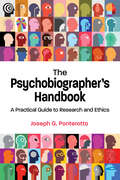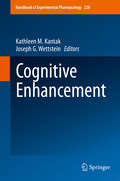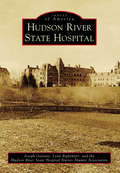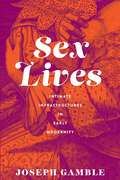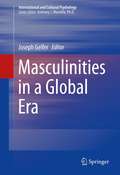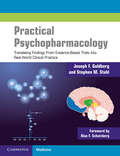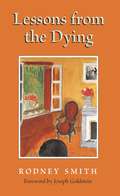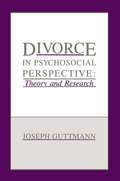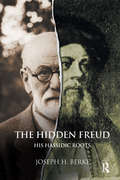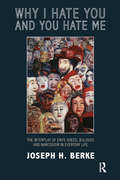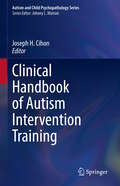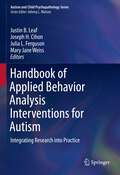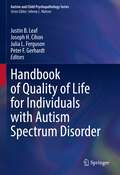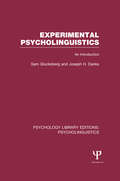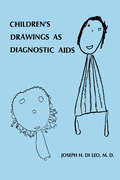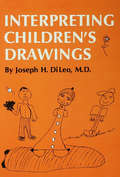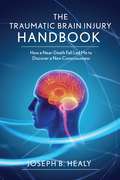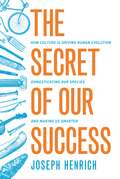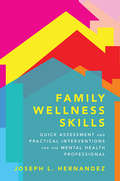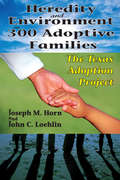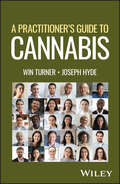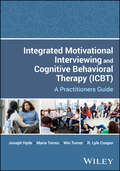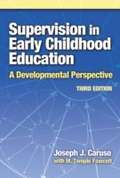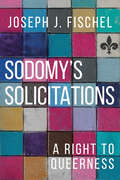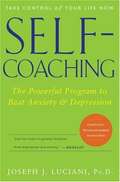- Table View
- List View
The Psychobiographer's Handbook: A Practical Guide to Research and Ethics
by Joseph G. PonterottoA practical guide to conducting psychobiography, including the theory, methods, and ethical considerations required for research and writing.
Cognitive Enhancement (Handbook of Experimental Pharmacology #228)
by Kathleen M. Kantak Joseph G. WettsteinThis book highlights the behavioral and neurobiological issues relevant for drug development, reviews evidence for an innovative approach for drug discovery and presents perspectives on multiple special topics ranging from therapeutic drug use in children, emerging technologies and non-pharmacological approaches to cognitive enhancement.
Hudson River State Hospital (Images of America)
by Joseph Galante Lynn Rightmyer the Hudson River State Hospital Nurses Alumni AssociationFor 141 years, Hudson River State Hospital was home to tens of thousands of individuals suffering from mental illness. The facility grew from a 208-acre parcel in 1871 with seven patients to 752 acres with five dozen separate buildings containing nearly 6,000 patients in 1954. The main building was constructed on a Kirkbride plan, a treating philosophy centered around an ornate building of equal proportions staffed by employees who integrated dignity and compassion into health care. Famous architects Frederick Clark Withers and Calvert Vaux drafted the main building in 1869. The landscape was penned by Frederick Law Olmstead, perhaps best known for the design of New York City's Central Park.
Sex Lives: Intimate Infrastructures in Early Modernity
by Joseph GambleIn Sex Lives, Joseph Gamble draws from literature, art, and personal testimonies from sixteenth- and seventeenth-century Europe to uncover how early moderns learned to have sex. In the early modern period, Gamble contends, everyone from pornographers to Shakespeare recognized that sex requires knowledge of both logistics (how to do it) and affect (how to feel about it). And knowledge, of course, takes practice.Gamble turns to a wide range of early modern texts and images from England, France, and Italy, ranging from personal accounts to closet dramas to visual art in order to excavate and analyze a variety of sexual practices in early modernity. Using an intersectional, phenomenological approach to bring historical light to the quotidian sexual experiences of early modern subjects, the book develops the critical concept of the “sex life”—a colloquialism that opens up methodological avenues for understanding daily lived experience in granular detail, both in the distant past and today. Through this lens, Gamble explores how sex organized and permeated everyday life and experiences of gender and race in early modernity. He shows how affects around sex structure the plays of Shakespeare and his contemporaries, revealing the role of sexual feeling and sexual racism in early modern English drama.Sex Lives reshapes how we understand Renaissance literature, the history of sexuality, and the meaning of sex in both early modern Europe and our own moment.
Masculinities in a Global Era
by Joseph GelferMasculinities in a Global Era extends the conversation of masculinity studies by analyzing global masculinities from a psychological perspective. Canvassing a broad array of psychological aspects such as the construction of identity, the negotiation of power, coping with trauma, and sexuality, this volume shows how masculinities are experienced, performed and embodied in geographically dispersed communities. Importantly, Masculinities in a Global Era fulfills a much-needed but elusive need within the study of masculinities: a forum in which the often polarized approaches of pro-feminists and men's rights advocates can begin to move beyond their entrenched historical positions towards a more fruitful and nuanced future.
Practical Psychopharmacology: Translating Findings From Evidence-Based Trials into Real-World Clinical Practice
by Stephen Stahl Joseph GoldbergDespite the lack of guidance available for practitioners, extensive polypharmacy has become the primary method of treating patients with severe and chronic mood, anxiety, psychotic or behavioral disorders. This ground-breaking new book provides an overview of psychopharmacology knowledge and decision-making strategies, integrating findings from evidence-based trials with real-world clinical presentations. It adopts the approach and mind-set of a clinical investigator and reveals how prescribers can practice 'bespoke psychopharmacology', tailoring care to the individualized needs of patients. Practitioners at all levels of expertise will enhance their ability to devise rationale-based treatments, targeting manifestations of dysfunctional neural circuitry and dimensions of psychopathology that cut across conventional psychiatric diagnoses. Presented in a user-friendly, practical, full-colour layout and incorporating summary tables, bullet points, and illustrative case vignettes, it is an invaluable guide for all healthcare professionals prescribing psychotropic medications, including psychiatry specialists, primary care physicians, and advanced practice registered nurses.
Lessons from the Dying
by Joseph Goldstein Rodney SmithAre a person's perceptions and values altered when facing the end of life? Do the dying see the world in a way that could help the rest of us learn how to live? This book takes us into the lessons of the dying. Through the words and circumstances of the terminally ill, we become immersed in their wisdom and in our own mortality. The dying speak to us in direct and personal ways, pointing toward a wise and sane way to live. In everyday language we can all understand, Rodney Smith extends the conversation about death to people of all ages and states of health. Through exercises and guided meditative reflections at the end of each chapter, the lessons of the dying become a blueprint for our own growth.
Divorce in Psychosocial Perspective: Theory and Research
by Joseph GuttmannMany books deal with divorce and its aftermath -- some deal with the impact of divorce on children and families, others with the legal or sociological aspects of divorce, and a few focus on divorced mothers and fathers. Most of these books are characterized by their practical orientation toward the issues and problems posed by divorce. None of these, however, have attempted to offer an integrated view of the massive amount of theoretical and research literature on divorced adults and their children. In addition, none present a comprehensive view of divorce as a psychological process within its larger social context. Filling that void, this book: * offers a comprehensive view of divorce as a social, interpersonal and psychological phenomenon, * reviews the theory and research on divorce focusing on the major protagonists of the divorce drama: the mother, the father and the children, and * introduces a social-psychological theory of divorce process.
The Hidden Freud: His Hassidic Roots
by Joseph H. BerkeThis book explores Sigmund Freud and his Jewish roots and demonstrates the input of the Jewish mystical tradition into Western culture via psychoanalysis. It shows in particular how the ideas of Kabbalah and Hassidism have profoundly influenced and enriched our understanding of mental processes and clinical practices. Freud's own ancestors were hassidim going back many generations, and the book examines how this background influenced both his life and his work. It also shows how he struggled to deny these roots in order to be accepted as a secular, German professional, and at the same time how he used them in the development of his ideas about dreaming, sexuality, depression and mental structures as well as healing practices. The book argues that in many important respects psychoanalysis can be seen as a secular extension of Kabbalah. The author shows, for example, how Freud utilized the Jewish mystical tradition to develop a science of subjectivity.
Why I Hate You and You Hate Me: The Interplay of Envy, Greed, Jealousy and Narcissism in Everyday Life
by Joseph H. BerkeThis book considers the experience of envy, greed, jealousy, and narcissism and how they operate between parents and children, brothers and sisters. It focuses on the object of these harmful emotions, what attracts malice to them, and how they may arouse it.
Clinical Handbook of Autism Intervention Training (Autism and Child Psychopathology Series)
by Joseph H. CihonThis handbook addresses evidence-based training practices for individuals providing applied behavior analysis (ABA) interventions for individuals on the autism spectrum. It provides specific examples of interventions across various contexts and skills and addresses the importance of effective and efficient training as it relates to ABA-based interventions for individuals on the autism spectrum. Additional areas of coverage include, but are not limited to, staffing, clinical judgment, shaping, mealtime interventions, qualities of effective trainers and developing effective training systems. Key areas of coverage include: • Training versus mentorship. • Developing systems and contingencies related to training within an organization. • Ensuring a common vocabulary with trainers and trainees. • Development of clinical judgment. • Cultural considerations within training. The Clinical Handbook of Autism Intervention Training is a must-have resource for clinicians, therapists, and other practitioners and professionals as well as researchers, professors, and graduate students across such interrelated disciplines as clinical child, school, and developmental psychology, child and adolescent psychiatry, clinical social work, public health, rehabilitation medicine/physical and occupational therapy, special education, pediatrics, and neurology.
Handbook of Applied Behavior Analysis Interventions for Autism: Integrating Research into Practice (Autism and Child Psychopathology Series)
by Justin B. Leaf Mary Jane Weiss Joseph H. Cihon Julia L. FergusonThis handbook addresses evidence-based practices in Applied Behavior Analysis (ABA) for individuals diagnosed with autism spectrum disorder (ASD). It provides an overview of the history of evidence-based practices and their importance as applied to the law, school settings, and factors that influence the use for treatment of ASD. Additional areas of coverage include evidence-based and non-evidence-based ABA interventions for autism as well as decision-making ethics related to these treatments. In addition, the book addresses cultural considerations as they relate to these treatments and examines procedural aspects of ABA interventions for autism. Key ABA treatments addressed include: Discrete trial teaching. Pivotal response training. Video modeling. Parent-mediated intervention. Early Start Denver Model, PEAK, PECS, and AAC. Script fading/activity schedules and differential reinforcement/extinction. Response interruption and redirection. Self-management and self-monitoring. The Handbook of Applied Behavior Analysis Interventions for Autism is a must-have resource for researchers, professors, and graduate students as well as clinicians, therapists, and other professionals across such interrelated disciplines as clinical child, school, and developmental psychology, child and adolescent psychiatry, social work, rehabilitation medicine/therapy, pediatrics, and special education.
Handbook of Quality of Life for Individuals with Autism Spectrum Disorder (Autism and Child Psychopathology Series)
by Justin B. Leaf Joseph H. Cihon Julia L. Ferguson Peter F. GerhardtThis handbook offers a comprehensive examination of wide-ranging issues relevant to adults diagnosed with autism spectrum disorder. Coverage includes a detailed review of such issues as psychiatric comorbidity, family relationships, education, living in different settings (e.g., group homes, community), meaningful and effective interventions, functional goals (e.g., social, language, vocational, and adaptive behaviors), and curriculum. In addition the book provides unique perspectives of parents as well as individuals diagnosed with autism spectrum disorder who have reached adulthood.Key areas of coverage include: Transitioning adults diagnosed with autism spectrum disorder from educational settings to vocational settings. Strategies that can help create independence for adults diagnosed with autism spectrum disorder. Effective approaches to address issues relating to sexuality for adults diagnosed with autism spectrum disorder. The effectiveness of early intensive behavioral intervention to help adults diagnosed with autism spectrum disorder. Handbook of Quality of Life for Individuals with Autism Spectrum Disorder is an essential reference for researchers, professors, and graduate students as well as clinicians, therapists, and related professionals in clinical child and school psychology, social work, behavioral therapy and related disciplines, including clinical medicine, clinical nursing, counseling, speech and language pathology, and special education.
Experimental Psycholinguistics: An Introduction (Psychology Library Editions: Psycholinguistics)
by Sam Glucksberg Joseph H. DanksHow is speech produced and understood in the context of everyday communication? First published in 1975, this book is considered one the best of the early books in this field. The task of psycholinguistics is to discover how people produce and comprehend speech. This encompasses virtually all aspects of psychology, including perceptual, conceptual, and social processes. The authors tried to capture the flavour of this approach to the psychology of language by describing the major contemporary issues, problems, and phenomena, of the time, being dealt with in laboratories and in field studies, and by trying to make sense of the data they had. Experimental Psycholinguistics: An Introduction does not try to deal exhaustively with any one issue in linguistics or in psychology. Rather it tries to integrate the authors’ knowledge of language and language behaviour so that someone entering the field has an intelligible framework with which to start.
Children's Drawings As Diagnostic Aids
by Joseph H. Di LeoFirst published in 1973. Routledge is an imprint of Taylor & Francis, an informa company.
Interpreting Children's Drawings
by Joseph H. Di LeoFirst published in 1983. Routledge is an imprint of Taylor & Francis, an informa company.
Traumatic Brain Injury Handbook: How a Near-Death Fall Led Me to Discover a New Consciousness
by Joseph HealyNew Consciousness is the ultimate brain injury recovery handbook. Inside, acclaimed writer Joe Healy comprehensively discusses what leads to brain injuries and how to heal from them and manage them during the process. Recovery techniques are lifestyle modifications: nutritional, physical, occupational, and attitude ones. This is an important title for all family and friends of sufferers of brain injuries, doctors, and caretakers. With Healy's guidance, support networks will learn how to lead sufferers on their journey back to "normalcy," working and socializing as the person did before the traumatic event. This unique book is distinctive in its scope, covering the science of the brain, its easy-to-follow nature, its accuracy, and its encouraging you-can-recover, don't just learn to cope and give up attitude. Family, friends of the injured person no longer need to feel alone, discouraged, or overwhelmed. This is a much-needed, hands-on, and extremely valuable volume.
The Secret of Our Success: How Culture Is Driving Human Evolution, Domesticating Our Species, and Making Us Smarter
by Joseph HenrichHumans are a puzzling species. On the one hand, we struggle to survive on our own in the wild, often failing to overcome even basic challenges, like obtaining food, building shelters, or avoiding predators. On the other hand, human groups have produced ingenious technologies, sophisticated languages, and complex institutions that have permitted us to successfully expand into a vast range of diverse environments. What has enabled us to dominate the globe, more than any other species, while remaining virtually helpless as lone individuals? This book shows that the secret of our success lies not in our innate intelligence, but in our collective brains--on the ability of human groups to socially interconnect and learn from one another over generations. Drawing insights from lost European explorers, clever chimpanzees, mobile hunter-gatherers, neuroscientific findings, ancient bones, and the human genome, Joseph Henrich demonstrates how our collective brains have propelled our species' genetic evolution and shaped our biology. Our early capacities for learning from others produced many cultural innovations, such as fire, cooking, water containers, plant knowledge, and projectile weapons, which in turn drove the expansion of our brains and altered our physiology, anatomy, and psychology in crucial ways. Later on, some collective brains generated and recombined powerful concepts, such as the lever, wheel, screw, and writing, while also creating the institutions that continue to alter our motivations and perceptions. Henrich shows how our genetics and biology are inextricably interwoven with cultural evolution, and how culture-gene interactions launched our species on an extraordinary evolutionary trajectory. Tracking clues from our ancient past to the present, The Secret of Our Success explores how the evolution of both our cultural and social natures produce a collective intelligence that explains both our species' immense success and the origins of human uniqueness.
Family Wellness Skills: Quick Assessment and Practical Interventions for the Mental Health Professional
by Joseph HernandezA psycho-educational model for assessing individuals and families. In Family Wellness Skills, Joseph Hernandez, a longtime Family Wellness trainer and practitioner, shares the foundational concepts of the Family Wellness model to make it accessible to an even broader audience. In it, he provides mental health professionals with a map to guide their clients from recognizing a need for change, to deciding to make a change, to achieving change itself. Hernandez lays out the core ideas behind Family Wellness--chief among them, balancing individuality with connection; fostering skills for interpersonal health (speaking, listening, and cooperating); and developing and maintaining patterns that work for families (mutual respect, parents in charge, interdependence, and expecting change). He shows all helping professionals how to develop effective treatment plans and practical interventions that take into account a family's inherent assets. Family Wellness Skills provides a complete, handy guide to the key points of this successful treatment model, so any mental health professional can help families discover and develop their gifts and abilities, making for stronger, healthier relationships.
Heredity and Environment in 300 Adoptive Families: The Texas Adoption Project
by Joseph HornThis book presents the results of a thirty-five-year research project involving 300 families, each of whom adopted at least one child at birth from a Texas home for unwed mothers during the period of 1962-1970. The book weaves together information about the birth parents of the adopted children; information about the adoptive parents; and information about the children in these families. Children adopted at birth have two sets of parents. Birth parents provide their adopted-away child with a genetic endowment, but do not participate in shaping the child's environment. Adoptive parents do not contribute genetically, but are otherwise in charge of directing the child's development. If adopted children grow up to resemble birth parents they have never seen, the clear inference is that hereditary factors have had an influence. Environmental factors are implicated whenever children resemble their adoptive parents, but not the birth parents. The Texas Adoption Project was designed to investigate the impact of genetic and environmental factors. This unique and innovative longitudinal study is written for specialists and the educated public. An introductory guide is provided for the non-specialist reader explaining the form and statistical content of the tables. Additional technical material for specialists is contained in appendices. This important contribution to the literature on adoption will also be of interest to those interested in the relative weight of genetics and environment in human development.
A Practitioner's Guide to Cannabis
by Win Turner Joseph HydeInform and improve your practice with this comprehensive resource on cannabis use and abuse A Practitioner's Guide to Cannabis expertly cuts through the political and cultural noise surrounding cannabis use and provides a relevant, timely, and agnostic analysis of cannabis use and abuse. Incisive and insightful, this book assists behavioral health practitioners to increase their skills in screening, assessment, and intervention while helping them to adopt evidence-based practices. Health care providers will come to rely on this comprehensive resource to understand the risks of cannabis use and to provide a set of intervention strategies effective in a variety of settings. The book covers topics crucial for understanding the work of behavioral health and health practitioners dealing with cannabis issues, including: the complexities of cannabis science our cultural interpretations of the use of cannabis the risks involved with cannabis use effective interventions patients' expressions of their own "biopsychosocial" experience The book is perfect for social workers, psychologists, professional counselors, alcohol/drug counselors, and providers of health care, including physicians, nurses, and physician's assistants.
Integrated Motivational Interviewing and Cognitive Behavioral Therapy (ICBT): A Practitioners Guide
by Maria Torres Win Turner Joseph Hyde R. Lyle CooperA practical approach to clinical interventions applicable to a range of mental health diagnoses Integrated Motivational Interviewing and Cognitive Behavioral Therapy (ICBT) for Adults is a guide for practitioners looking for evidence-based clinical interventions that are portable across settings and diagnoses. Written in plain English and with an emphasis on step-by-step instructions, this valuable toolkit collects strategies and interventions that have been shown to be effective in substance use disorder, depression, anxiety, and beyond. This widely applicable treatment approach draws on motivational interviewing, cognitive behavioral therapy (CBT), motivational enhancement therapy, mindfulness, functional analysis, and other methods that are strongly supported in the literature. With content reflecting emerging research findings and evolving social contexts, this book is both timely and firmly rooted in science. After presenting a set of proven techniques for motivational interviewing and CBT, this book details a 16-session course designed to fit within conventional models of therapeutic practice. Each session covers a cognitive behavioral skill (e.g., assertiveness, handling cravings, suicidality) and builds upon the previous sessions, but they also work as standalone interventions and do not have to be followed in a particular order. The book also offers additional tools to promote intervention quality and clinical supervision. Worksheets, handouts, and other materials are included in photocopiable format, making this a valuable guide in all outpatient mental health settings. Learn the fundamentals of motivational interviewing, cognitive behavioral therapy, and other evidence-based treatment modalities Get practical clinical tools, including step-by-step session guides on cognitive behavioral skills relevant to a range of diagnoses Access self-assessments, clinical supervision tools, and other resources to enhance clinical effectiveness Incorporate emerging research, changing social contexts, and lessons learned from the COVID-19 pandemic into your practice Earlier editions of this guide focused on addressing substance use disorders and cooccurring disorders. This edition is applicable to those disorders but reflects that these clinical strategies are transdiagnostic.
Supervision In Early Childhood Education: A Developmental Perspective
by Joseph J. Caruso M. Temple FawcettEvery early care and education program deserves a qualified and competent supervisor. This pioneering text continues to address the special needs of administrators and staff to help them expand and improve their supervisory skills. The first to provide guidelines and practical suggestions for staff training and development in early childhood settings, this classic volume is still the best choice for those supervising staff from a wide variety of educational and cultural backgrounds.
Sodomy's Solicitations: A Right to Queerness (Sexuality Studies)
by Joseph J. FischelJoseph Fischel’s provocative book, Sodomy’s Solicitations, builds out a politics of sexual justice that challenges state sex exceptionalism. By tracing several twenty-first century contestations around Louisiana anti-sodomy laws, Fischel examines patterns and practices of sexual injustice that are too easily eclipsed by our collective focus on marginalized identities. The political stories narrated in Sodomy’s Solicitations are undoubtedly stories of racism, sexism, homophobia, and transphobia, but they are also stories of other political problems—and political possibilities. Fischel indicts U.S. sex offender regulatory regimes as state-sponsored sexual violence; offers a qualified defense for sexual expression in public; and argues that animal sexual abuse laws, with their exemptions for industrial agricultural practices, authorize the suffering they were enacted to deter. He also makes the case that laws criminalizing the exchange of sex for money are unconstitutional, and proposes that the best way to protect trans and queer children might just be to enfranchise them. Sodomy’s Solicitations champions a right to queerness across rather than within identity formations—a right to relatively unpoliced gender, sexual, and intimate pluralism. In the series Sexuality Studies
Self-Coaching: The Powerful Program to Beat Anxiety and Depression (2nd edition)
by Joseph J. LucianiThe simple, untold truth about anxiety and depression is that they are habits of insecurity--and, like all habits, they can be broken. In this new edition of the highly successful Self-Coaching, Dr. Joseph Luciani shows you how to change your way of thinking and develop a healthy, adaptive way of living through his proven Self-Talk strategy for coaching yourself back to health.
